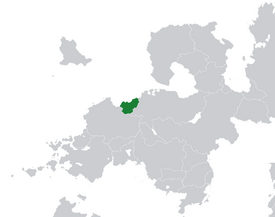Borland (Vasarden): Difference between revisions
No edit summary |
No edit summary |
||
| Line 120: | Line 120: | ||
}} | }} | ||
'''Borland''' ({{wp|Help:IPA/English|/bɔɹlənd/}}, <small>Borish pronunciation:</small> {{wp|Help:IPA/Dutch|/ˈboːrlɑnt/}}), officially the '''Republic of Borland''' ({{wp|Dutch language|Borish}}: ''Republiek Borland''), is a {{wp|country}} in central [[Patyria]], with overseas territories in [[the Artalias]]. Flanked by the [[Savic Sea]] of the [[Cercian Ocean]] on its northern coast, Borland is bordered by [[Apelia]] to the west and [[Vierzland]] to the east. The country has a highly-urbanized population of 23 million people, who are mainly concentrated in the capital city [[Anderveld]], as well | '''Borland''' ({{wp|Help:IPA/English|/bɔɹlənd/}}, <small>Borish pronunciation:</small> {{wp|Help:IPA/Dutch|/ˈboːrlɑnt/}}), officially the '''Republic of Borland''' ({{wp|Dutch language|Borish}}: ''Republiek Borland''), is a {{wp|country}} in central [[Patyria]], with overseas territories in [[the Artalias]]. Flanked by the [[Savic Sea]] of the [[Cercian Ocean]] on its northern coast, Borland is bordered by [[Apelia]] to the west and [[Vierzland]] to the east. The country has a highly-urbanized population of 23 million people, who are mainly concentrated in the capital city [[Anderveld]], as well as [[Stresen]] and [[Osterum]]. | ||
Borland's territory was settled by | Borland's territory was settled by {{wp|Germanic peoples|Veisic peoples}} who were eventually subsumed into the [[Pererran Empire]] in the 100s AD. | ||
Geopolitical conflicts on the continent put Borland in a precarious position as the "Battleground of Patyria". Borland officially declared {{wp|neutral country|neutrality}} during the [[Great War (Vasarden)|Great War]], but was invaded and occupied by [[Second Apelian Republic|Socialist Apelia]] in 1943. It was liberated from Apelian control in 1946 by the [[Vierz Empire]] and the [[Borish National Army]]. Borland was occupied by Vierz troops until 1949, after which it gained independence as a {{wp|satellite state}} of the Vierz Empire. During the ensuing [[Silent War (Vasarden)|Silent War]], known as the ''[[Rentmeesterschap period|Rentmeesterschap]]'' period in Borland, the country's government was an {{wp|Authoritarianism|authoritarian}} state. After a period of socioeconomic troubles in the 1980s, the [[Anderveld Uprising]] of 1987 prompted the withdrawal of Vierz troops from the country and the [[Borish Revolution|dissolution]] of the client government in 1988. | Geopolitical conflicts on the continent put Borland in a precarious position as the "Battleground of Patyria". Borland officially declared {{wp|neutral country|neutrality}} during the [[Great War (Vasarden)|Great War]], but was invaded and occupied by [[Second Apelian Republic|Socialist Apelia]] in 1943. It was liberated from Apelian control in 1946 by the [[Vierz Empire]] and the [[Borish National Army]]. Borland was occupied by Vierz troops until 1949, after which it gained independence as a {{wp|satellite state}} of the Vierz Empire. During the ensuing [[Silent War (Vasarden)|Silent War]], known as the ''[[Rentmeesterschap period|Rentmeesterschap]]'' period in Borland, the country's government was an {{wp|Authoritarianism|authoritarian}} state. After a period of socioeconomic troubles in the 1980s, the [[Anderveld Uprising]] of 1987 prompted the withdrawal of Vierz troops from the country and the [[Borish Revolution|dissolution]] of the client government in 1988. | ||
Revision as of 17:07, 31 March 2020
Republic of Borland Republiek Borland | |
|---|---|
Location of Borland (dark green) | |
| Capital and largest city | Anderveld |
| Official languages | Borish |
| Government | Unitary parliamentary republic |
| Sebastiaan Katenhorst | |
• Premier | Gustaaf Brants |
| Legislature | National Diet |
| State Council | |
| State Assembly | |
| Population | |
• 2019 estimate | 22,957,594 |
| GDP (PPP) | 2019 estimate |
• Total | $1.232 trillion |
• Per capita | $53,685 |
| GDP (nominal) | 2019 estimate |
• Total | $1.131 trillion |
• Per capita | $49,244 |
| Gini | medium |
| HDI | very high |
| Currency | Borish schat (ς) (BOR) |
| Date format | dd ˘ mm ˘ yyyy |
| Driving side | right |
| Calling code | +51 |
| Internet TLD | .bl |
Borland (/bɔɹlənd/, Borish pronunciation: /ˈboːrlɑnt/), officially the Republic of Borland (Borish: Republiek Borland), is a country in central Patyria, with overseas territories in the Artalias. Flanked by the Savic Sea of the Cercian Ocean on its northern coast, Borland is bordered by Apelia to the west and Vierzland to the east. The country has a highly-urbanized population of 23 million people, who are mainly concentrated in the capital city Anderveld, as well as Stresen and Osterum.
Borland's territory was settled by Veisic peoples who were eventually subsumed into the Pererran Empire in the 100s AD.
Geopolitical conflicts on the continent put Borland in a precarious position as the "Battleground of Patyria". Borland officially declared neutrality during the Great War, but was invaded and occupied by Socialist Apelia in 1943. It was liberated from Apelian control in 1946 by the Vierz Empire and the Borish National Army. Borland was occupied by Vierz troops until 1949, after which it gained independence as a satellite state of the Vierz Empire. During the ensuing Silent War, known as the Rentmeesterschap period in Borland, the country's government was an authoritarian state. After a period of socioeconomic troubles in the 1980s, the Anderveld Uprising of 1987 prompted the withdrawal of Vierz troops from the country and the dissolution of the client government in 1988.
Borland is a founding member of the International Assembly and the Borish Confederation, and a full member of the Union of Patyrian States. Since 1988, it has been a democratic, constitutional, parliamentary republic with a comprehensive welfare state and market economy. Borland maintains one of the highest standards of living in the world, ranking highly in the metrics of quality of life, educational attainment, and safety.


